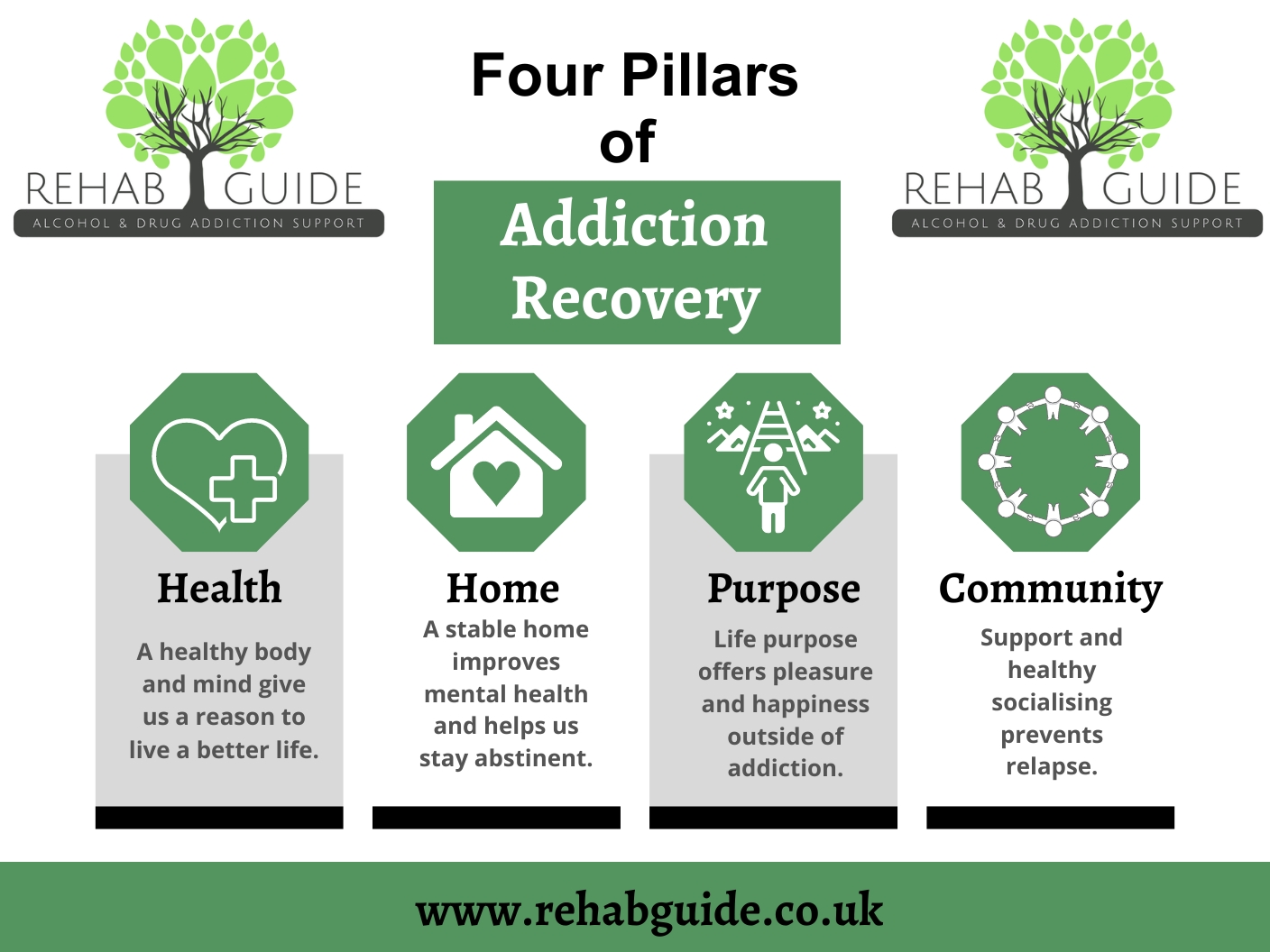The thought of alcohol rehab can raise many questions: Is it necessary? What does it involve? How do I know if it’s the right step? This page is here to provide clarity and reassurance, guiding you through what alcohol rehab is and how it can help.
Whether you’re exploring options for yourself or someone you care about, we’ll help you understand when alcohol rehab might be needed and what to expect.

An alcohol addiction can be devastating for everyone involved. It has the ability to cause havoc in every aspect of life, making help and support vital. Alcohol rehab provides a supportive and structured environment for a person to regain control of their lives
While many believe alcohol rehab to be a chance to “just stop drinking”, it goes much deeper than this.
At its core, alcohol rehab aims to heal the person as a whole, addressing not just the physical effects of alcohol but also the emotional and psychological challenges it creates. This often involves:
There are two main types of alcohol rehab: inpatient and outpatient. Inpatient alcohol rehab involves staying at a dedicated facility, where you receive 24/7 care and support in a structured environment. Outpatient alcohol rehab, on the other hand, allows you to live at home while attending scheduled therapy sessions and treatment programmes.
While the choice between the two is ultimately yours, these options exist for a reason: the severity of alcohol addiction can vary greatly. For those facing more severe challenges, inpatient rehab is often the safer and more effective option, especially for alcohol detox, which can have serious symptoms.
Given the devastating and dangerous nature of alcohol addiction, inpatient rehab options are highly recommended. Drug and alcohol addiction should be specific to the person needing it, and what works for one person might not do the trick for the next.
You might feel unsure about when to consider alcohol rehab, especially if it’s something you’ve never had to think about before. How do you know if it’s the right time? The truth is, there’s rarely a ‘perfect moment,’ but alcohol rehab can benefit anyone at any point during the addiction cycle.
This could be in the early stages of addiction, with rehab being used as a preventative step, or when the problem has grown more serious and needs focused care. Remember, alcohol rehab offers support at any stage.
If you’re unsure what signs might point to a potential issue with alcohol, here are some key indicators to consider:

Rehab of any kind is a deeply personal experience, and because of this, most people aren’t comfortable openly sharing what happens when they go. These days, the internet is often the main source of information, but with limited firsthand accounts available, it’s easy for scepticism to creep in.
This has led to common misconceptions about alcohol rehab, with some believing it’s like a form of punishment for being addicted to alcohol.
In reality, these ideas couldn’t be further from the truth. Over the years, we’ve heard many misconceptions about alcohol rehab and below, we address these thoughts:

At this point, you may be wondering exactly what happens during alcohol rehab. We’ve talked about what it isn’t and what it is, but without clearly outlining what to expect, it’s easy for misconceptions to linger. That’s why we’re happy to provide a step-by-step overview of what happens during alcohol rehab.
Most alcohol rehab centres start by checking your overall health to make sure there are no underlying issues that need attention. When someone is struggling with alcohol addiction, personal care often takes a backseat, so this is the perfect opportunity to see how your body is doing. This might include identifying health concerns directly linked to alcohol use or other missed issues.
You’ll also meet with the centre’s professional mental health team, who will determine if you need extra support throughout your rehab journey. These conversations are an opportunity for you to share your story and set the stage for personalised care that meets your specific needs.
Detoxing from alcohol is a necessary step to clear it from your body, but it’s often the most challenging stage of rehab. The good news is that you don’t have to face it alone. Many people have tried detoxing at home and found the symptoms too overwhelming to manage.
In a supervised alcohol detox, you’ll be supported by professionals who use counselling and, if needed, medications to ease withdrawal symptoms. This ensures you are safe and as comfortable as possible while your body adjusts to being alcohol-free. It’s a difficult step, but it’s also one that paves the way for real recovery.
Alcohol detox is an essential part of alcohol rehab, but it’s far from the end of the journey. Many people assume that once alcohol is out of their system, the work is done—but that’s just the beginning.
Therapies focus on uncovering and addressing the root causes of your addiction. They aim to help you understand what brought you to this point and equip you with tools to prevent relapse. Here are some but not all, of the key therapies you can expect:
This therapy helps you identify and challenge negative thought patterns that fuel your addiction. By recognising these triggers, you can develop healthier ways to respond, improving both your mindset and your ability to resist alcohol.
DBT is particularly useful for managing intense emotions or stress that may lead to drinking. It teaches practical skills like emotional regulation and distress tolerance, giving you tools to handle life’s challenges more effectively.
One-on-one sessions provide a private and safe space to discuss your personal experiences with addiction. This is your time to explore sensitive issues, address trauma or simply talk through feelings you may have been bottling up.
In a group setting, you’ll connect with others who understand what you’re going through. Sharing experiences, hearing different perspectives and receiving support from peers can be incredibly beneficial and may help reduce feelings of isolation.
When you leave alcohol rehab, you will have gone through a period of not drinking, which technically qualifies as being sober. However, sobriety in the context of alcohol addiction recovery isn’t as straightforward as simply abstaining from alcohol for a set period. Many people associate the word ‘sober’ with being fully recovered or even ‘cured,’ but addiction recovery doesn’t work in absolutes.
In reality, finishing alcohol rehab is the start of a new chapter rather than the end of the journey. Alcohol rehab provides you with the tools and strategies needed to address your addiction, but it’s up to you to continue using them in everyday life. Recovery is an ongoing process, one that requires effort, reflection and sometimes, adjustments.
This is why many rehab programmes include aftercare services. These can take the form of continued therapy sessions and even access to support groups like 12-step programmes. These types of support offer a safe space to discuss how you’re applying the skills learned during rehab and identify areas where you might need additional support.
For example, if you’ve faced situations where cravings were stronger than expected or old habits crept back in, this support can help you reflect on these moments. The main aim here is to focus on learning from these experiences and strengthening your resolve to stay sober. You’ll also find encouragement and guidance from others on the same path, reminding you that recovery is not something you have to navigate alone.
If you or someone you care about is struggling with alcohol addiction, it’s important to know that help is available. Whether you’re looking for rehab for alcohol abuse or seeking guidance on the rehabilitation of alcoholics, we’re here to provide the support you need with care and urgency.
Our team can provide free support to help you explore the best options, offering access to accredited alcohol rehabs across the UK. We work with trusted alcohol rehab centres, ensuring immediate admission is available when it’s most needed.
Don’t wait to take the next step. Contact us to start the journey toward recovery for yourself or a loved one today.

Alcohol rehab treatment is vital not just for the addicted person but for their friends and family, too. Addiction takes over your life and changes your relationships for the worse. The lives of people with alcoholism are legitimately at risk when they are drinking, as well as their mental health. The rehab portion of stopping drinking comes after the detox but is just as important if you want to avoid relapse in the future.
Rehab for alcoholics provides a safe and supportive space for recovery. Rehabilitation facilities for alcohol include detox, therapy and aftercare. Each alcoholism rehab programme is personalised, focusing on long-term healing and a healthier lifestyle.
Alcohol addiction rehab helps individuals overcome drinking habits through detox, therapy and support. Rehabilitation centres for alcoholism focus on both physical and emotional recovery. These programmes guide individuals toward a healthier and addiction-free future.
If alcohol affects your health or relationships, rehabilitation for drinking can help. Rehabs for alcoholics provide professional support and therapy. They also offer alcohol intervention services to help individuals start their recovery journey.
The UK offers many rehabilitation facilities for alcohol addiction. Drink rehabilitation programmes include detox and therapy. These centres provide liquor addiction treatment and ongoing support to ensure long-term recovery and well-being.